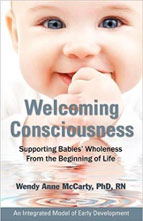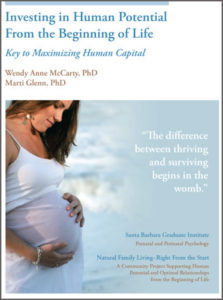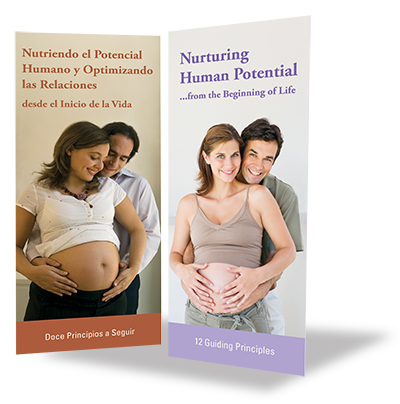Origins of the 12 Guiding Principles
APPPAH
Understanding our earliest relationship experiences from the baby’s point of view and how these experiences set in motion life patterns has been the intense study of the field of prenatal and perinatal psychology for over 40 years. In 1983, the field of prenatal and perinatal psychology coalesced with the creation of the Association For Prenatal And Perinatal Psychology And Health (APPPAH).
Santa Barbara Graduate Institute (SBGI)
Santa Barbara Graduate Institute opened in 2000, offering the first Masters and Doctoral Degrees in Prenatal and Perinatal Psychology (PPN). Marti Glenn, PhD, Founding President, and Wendy Anne McCarty, PhD, Founding Chair, co-authored the initial six PPN degree programs and curriculum. Dr. McCarty taught several of the PPN graduate courses during the 12 years the school was open.
Drs. Glenn and McCarty believed graduate level education was the next important step in developing the emerging field of prenatal and perinatal psychology. Scholarly studies and dialogue, original research, and training in specialized PPN therapeutic skills were needed to prepare professionals to work with families during the prenatal and perinatal period, as well as to identify and treat early experience-related issues in all ages—children, adolescents, and adults.

Dr. Wendy Anne McCarty,
Founding Chair, SBGI
As they began to teach PPN graduate students, they saw a need for new early development theories/models based upon PPN clinical understandings. PPN findings clearly expanded the landscape of early development from the current mainstream theories and models, to include a multidimensional understanding of babies’ capacities and early human experience.
The field of PPN had emerged primarily from clinical work with babies, children and adults valuing the baby’s point of view. A tremendous wealth of understanding about the origins of very early trauma, unmet needs, compromised neurodevelopment, and relationship issues, and how to work those issues had been harvested.
Yet PPN’s clinical findings were yet to be utilized to create new “normal” early development models and theories about who babies are and the expanded landscape of early development though the PPN lens.
 To this end, Dr. McCarty received an academic grant and developed her Integrated Model of Early Development, a consciousness-based multidimensional understanding of early development that could hold the PPN findings and include mainstream perspectives as well. This new model was published in Welcoming Consciousness: Supporting Babies Wholeness from the Beginning of Life (2004, 2009, 2012) and became a core text for PPN courses.
To this end, Dr. McCarty received an academic grant and developed her Integrated Model of Early Development, a consciousness-based multidimensional understanding of early development that could hold the PPN findings and include mainstream perspectives as well. This new model was published in Welcoming Consciousness: Supporting Babies Wholeness from the Beginning of Life (2004, 2009, 2012) and became a core text for PPN courses.
A second need was identified while teaching the PPN curriculum and listening to students grappling with the wide range of focuses, findings, and approaches found within the prenatal and perinatal psychology community. Students would ask, “Where is there a clear articulation of core principles to guide professionals and families that arise from the decades of PPN–oriented knowledge and understanding?”
Dr. McCarty had admired the attachment community’s set of core principles that served as a vital beacon for attachment research, theory, and professional and parenting practice. Parents, professionals, and community programs could use these to articulate and develop their care and programs. Parents could choose professionals who supported the attachment principles and values.
Other organizations had effective proclamations as well for their guiding principles, values, and standard of care, such as Baby-Friendly and Mother-Friendly Care Initiatives. Dr. McCarty and Dr. Glenn saw the importance for the prenatal and perinatal psychology community to develop guiding principles and thus initiated another academic grant project for this purpose.
Natural Family Living ~ Right from the Start
This year-long academic community project was funded by the James B. Bower Foundation through the Santa Barbara Graduate Institute Center for Clinical Studies and Research with Dr. McCarty acting as Program Director. (2007 – 2008).

The project goals included developing a new set of guiding principles that would articulate values, principles, and philosophy from the PPN perspective of early development. The vision was for these guiding principles to be the organizing foundation for training, community education, community initiatives, professional training and practice, parenting practice, and parent-to-parent support groups. The guiding principles would also be the foundation of a PPN graduate curriculum.
12 Guiding Principles Prenatal and Perinatal Psychology:
Nurturing Human Potential and Optimizing Relationships from the Beginning of Life
Natural Family Living brought together a group of leading PPN clinical experts who had been supporting babies, children, families and adults for decades and who were instructors of our graduate PPN courses. Together, we distilled the new holistic PPN understandings and values into twelve guiding principles and published them in the user-friendly 12 Guiding Principles Brochure.
Dr. McCarty and Dr. Glenn completed the grant project with their seminal position paper, “Investing in Human Potential from the Beginning of Life: Keystones to Maximizing Human Capital,” first published in The Journal of Prenatal and Perinatal Psychology and Health (2008).
 In the paper, funders and community leaders are called upon to focus their greatest efforts at the beginning of life – during the primary period of early development. The 12 Guiding Principles provide the core foundation for these recommendations and vision.
In the paper, funders and community leaders are called upon to focus their greatest efforts at the beginning of life – during the primary period of early development. The 12 Guiding Principles provide the core foundation for these recommendations and vision.
The paper is intended to be a support document for everyone to use to in efforts to bring more awareness, funding, and programs to support families during the prenatal and perinatal period.
> PDF for digital use
> PDF for full-color printing
The Association for Prenatal and Perinatal Psychology and Health adopts and endorses these principles and the proclamation document.


